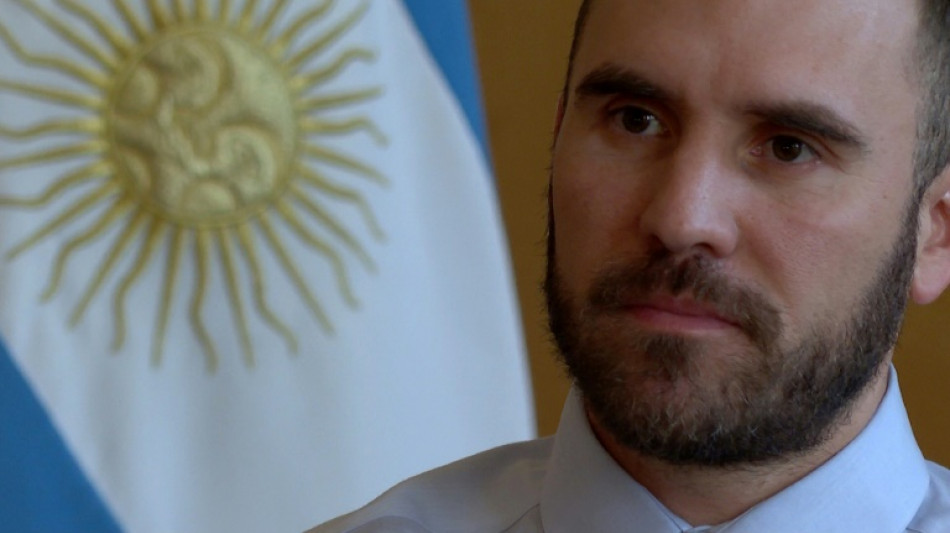
-
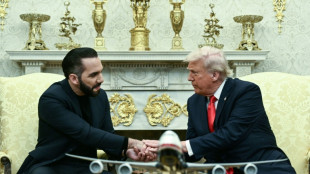 El Salvador becoming 'black hole' for US deportees, critics fear
El Salvador becoming 'black hole' for US deportees, critics fear
-
Trump admin proposes redefining 'harm' to endangered animals

-
 Australia's Mary Fowler set for long lay-off after ACL injury
Australia's Mary Fowler set for long lay-off after ACL injury
-
Rubio to meet French leaders for talks on Ukraine
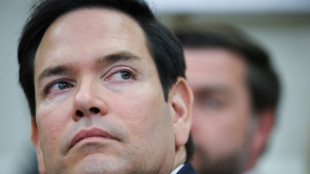
-
 Webb spots strongest 'hints' yet of life on distant planet
Webb spots strongest 'hints' yet of life on distant planet
-
Arteta's Arsenal come of age with Madrid masterclass

-
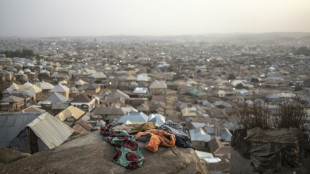 None spared in Nigeria gun, machete massacre: survivors
None spared in Nigeria gun, machete massacre: survivors
-
'No problem' if Real Madrid replace me: Ancelotti

-
 Inter dreaming of treble glory after reaching Champions League semis
Inter dreaming of treble glory after reaching Champions League semis
-
'No limits' for treble-hunting Inter, says Pavard

-
 Inter off Bayern to reach Champions League last four
Inter off Bayern to reach Champions League last four
-
Rice 'knew' Arsenal would dethrone Real Madrid

-
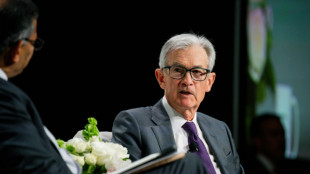 US stocks fall with dollar as Powell warns on tariffs
US stocks fall with dollar as Powell warns on tariffs
-
Arsenal oust holders Real Madrid to reach Champions League semis

-
 Arsenal defeat Real Madrid to reach Champions League semis
Arsenal defeat Real Madrid to reach Champions League semis
-
AMD says US rule on chips to China could cost it $800 mn

-
 Inter hold off Bayern to reach Champions League last four
Inter hold off Bayern to reach Champions League last four
-
El Salvador rejects US senator's plea to free wrongly deported migrant
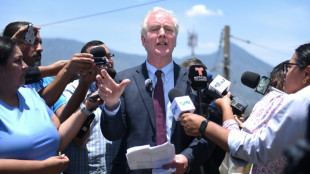
-
 Newcastle thrash Crystal Palace to go third in Premier League
Newcastle thrash Crystal Palace to go third in Premier League
-
Zuckerberg denies Meta bought rivals to conquer them

-
 Starc stars as Delhi beat Rajasthan in Super Over
Starc stars as Delhi beat Rajasthan in Super Over
-
Weinstein asks to sleep in hospital, citing prison 'mistreatment'

-
 Amorim asks McIlroy to bring Masters magic to Man Utd
Amorim asks McIlroy to bring Masters magic to Man Utd
-
Ruud keeps Barcelona Open defence on course

-
 Trump tariffs could put US Fed in a bind, Powell warns
Trump tariffs could put US Fed in a bind, Powell warns
-
CONCACAF chief rejects 64-team World Cup plan for 2030
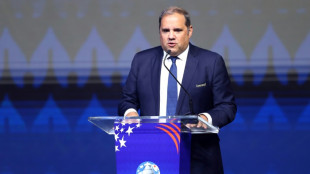
-
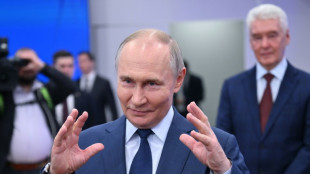 Putin praises Musk, compares him to Soviet space hero
Putin praises Musk, compares him to Soviet space hero
-
Son to miss Spurs' Europa League trip to Frankfurt

-
 US senator in El Salvador seeking release of wrongly deported migrant
US senator in El Salvador seeking release of wrongly deported migrant
-
Trump tariffs could put the US Fed in a bind, Powell warns

-
 US judge says 'probable cause' to hold Trump admin in contempt
US judge says 'probable cause' to hold Trump admin in contempt
-
India opposition slams graft charges against Gandhis

-
 Nate Bargatze to host Emmys: organizers
Nate Bargatze to host Emmys: organizers
-
US Fed Chair warns of 'tension' between employment, inflation goals

-
 Trump touts trade talks, China calls out tariff 'blackmail'
Trump touts trade talks, China calls out tariff 'blackmail'
-
US judge says 'probable cause' to hold govt in contempt over deportations

-
 US eliminates unit countering foreign disinformation
US eliminates unit countering foreign disinformation
-
Germany sees 'worrying' record dry spell in early 2025

-
 Israel says 30 percent of Gaza turned into buffer zone
Israel says 30 percent of Gaza turned into buffer zone
-
TikTok tests letting users add informative 'Footnotes'

-
 Global uncertainty will 'certainly' hit growth: World Bank president
Global uncertainty will 'certainly' hit growth: World Bank president
-
EU lists seven 'safe' countries of origin, tightening asylum rules

-
 Chelsea fans must 'trust' the process despite blip, says Maresca
Chelsea fans must 'trust' the process despite blip, says Maresca
-
Rebel rival government in Sudan 'not the answer': UK

-
 Prague zoo breeds near-extinct Brazilian mergansers
Prague zoo breeds near-extinct Brazilian mergansers
-
Macron to meet Rubio, Witkoff amid transatlantic tensions

-
 WTO chief says 'very concerned' as tariffs cut into global trade
WTO chief says 'very concerned' as tariffs cut into global trade
-
Sports bodies have 'no excuses' on trans rules after court ruling: campaigners

-
 Zverev joins Shelton in Munich ATP quarters
Zverev joins Shelton in Munich ATP quarters
-
The Trump adviser who wants to rewrite the global financial system
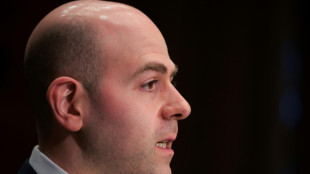

IMF risks losing legitimacy over Argentina loan: minister
Argentina's economy minister, renegotiating a massive loan with the International Monetary Fund, warned the lender risked losing credibility if it "pushes" the country "into a destabilizing situation."
Argentina has received $44 billion of a $57 billion loan the lender itself said last month had failed to achieve its objectives of restoring confidence in the country's fiscal viability and fostering economic growth.
Latin America's third-largest economy has been in recession since 2018 and is seeking to renegotiate its down payment plan, with amounts of $19 billion and $20 billion due in 2022 and 2023.
The country registered GDP growth of 10 percent in 2021 after a drop of 9.9 percent the previous year largely due to the coronavirus pandemic.
Guzman, in an interview with AFP, said the repayment calendar was "unsustainable" for a country battling a poverty rate of some 40 percent and one of the highest inflation rates in the world at 50 percent.
The government of center-left President Alberto Fernandez, who refused to accept the last $13 billion of the IMF's biggest-ever loan arranged in 2018 under his conservative predecessor Mauricio Macri, is seeking a deal that will reduce Argentina's fiscal deficit through economic growth, not reduced public spending.
Here is what the minister said:
Q: How do you see 2022 unfolding? Is there a risk of a default?
A: Argentina has a very high trade surplus, which is at the highest levels we have achieved. It was over $15 billion in 2021. What is the balance of payments problem facing Argentina in 2022? It is precisely the debt with the IMF. And that is why it is important to refinance it.
It is important for the country and also for the IMF.
If the IMF pushes Argentina into a destabilizing situation, it will also have less legitimacy in the future when other countries require multilateralism in order to solve their problems with the international community.
If we want to protect each other and protect the workings of multilateralism, it is important to agree on something that is credible. And credible means implementable.
We have a set of economic and social objectives, and of course we want to deliver on our commitments, but we need time. We need to be able to refinance these debts.
We need not, for that time, to be burdened with a conditionality that stops recovery and inhibits Argentina's capacity for development in the medium and long term.
Q: Are you expecting support from the United States as the IMF's biggest shareholder? What do you make of the call by Democratic lawmakers to US Treasury Secretary Janet Yellen to back a review of IMF surcharges on larger, outstanding loans, especially at a time that countries need additional resources to fight the pandemic?
A: That was an important request to the Secretary of the Treasury of the United States to support in the IMF board a review of this policy, which harms countries in crisis that have what is called "exceptional access to the International Monetary Fund."
They are charged more when the situation is worse. That... does not help to fulfil the Fund's mission of ensuring global financial stability. Countries with these interest surcharges lose resources with which to carry out the investments needed to improve repayment capacity.
Q: Where does the disagreement lie?
A: There is nearly agreement on where to converge; what is the primary fiscal outcome (before the payment of interest).
The disagreement lies in the speed (of repayment) and this has to do with differing objectives.
In 2021, with an economy growing at 10 percent, the primary fiscal deficit fell by 3.5 percent of GDP. The fiscal deficit in 2021 was between 2.9 percent and 3.0 percent of GDP -- the figure will be known on January 20. It is a strong decline. Good fiscal consolidation is taking place.
What the IMF has put forward is that there must be faster fiscal consolidation.
But there are two problems: the first is that how they propose it be done would halt economic recovery in the short term. The second is that... it would focus on a smaller expansion of investment in public infrastructure. For us this is critical, because that investment is what Argentina needs most, from a productive point of view. That is where the tension lies.
Q: You have made reference to the difference between a perfect agreement and an acceptable one. Are you getting closer to an acceptable deal?
A: There is no perfect agreement...
What we are looking for is to move forward rather than backward. I'd say we are a little better than we were a week ago, but there is a long road ahead. The frequency (of contacts with the IMF) is not only daily, but several times a day.
O.Lorenz--BTB
